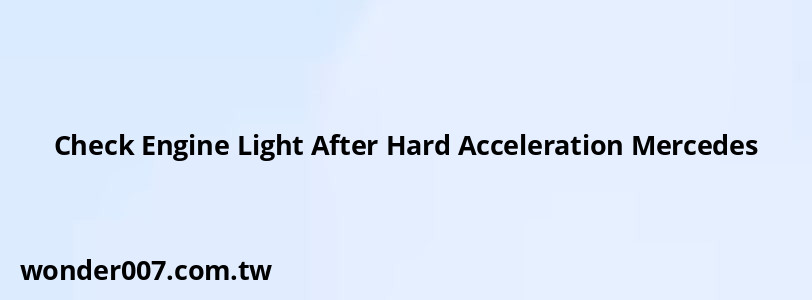Check Engine Light After Hard Acceleration Mercedes

Common Causes
When your Mercedes check engine light comes on after hard acceleration, it often indicates a problem with the engine or related systems. Here are some common causes:
1. Engine Misfire: This is a frequent issue, especially during hard acceleration. Misfires can occur due to worn spark plugs, faulty ignition coils, or fuel delivery problems.
2. Overboost Condition: In turbocharged Mercedes models, hard acceleration can sometimes trigger an overboost condition, causing the engine to enter limp mode and illuminate the check engine light.
3. Catalytic Converter Issues: Aggressive acceleration can sometimes damage or clog the catalytic converter, particularly if it's already in a weakened state.
4. Oxygen Sensor Malfunction: Hard acceleration can sometimes cause temporary rich fuel conditions, which may trigger a fault in the oxygen sensors.
5. Mass Airflow Sensor (MAF) Problems: The MAF can become contaminated or fail, leading to incorrect air-fuel mixture calculations, especially noticeable during hard acceleration.
Immediate Actions
If your Mercedes check engine light comes on after hard acceleration:
1. Reduce Speed: Immediately ease off the accelerator and reduce your speed.
2. Check for Performance Issues: Pay attention to any unusual sounds, vibrations, or loss of power.
3. Restart the Engine: In some cases, particularly with overboost conditions, turning off the engine and restarting it may clear the issue temporarily.
4. Avoid Hard Acceleration: Drive conservatively until you can have the vehicle diagnosed.
5. Scan for Codes: Use an OBD-II scanner to read any diagnostic trouble codes (DTCs) stored in the engine control unit.
Professional Diagnosis
While some issues may resolve temporarily, it's crucial to have your Mercedes professionally diagnosed when the check engine light appears after hard acceleration. A qualified technician can:
- Perform a comprehensive diagnostic scan
- Inspect key components like spark plugs, ignition coils, and sensors
- Check for any physical damage to engine components
- Assess the health of the catalytic converter
- Verify proper functioning of the turbocharger system (if applicable)
Preventive Measures
To reduce the likelihood of check engine light issues during hard acceleration:
- Regular Maintenance: Follow Mercedes-Benz recommended service intervals.
- Quality Fuel: Use high-quality fuel appropriate for your Mercedes model.
- Gentle Acceleration: Avoid frequent hard acceleration, especially when the engine is cold.
- Address Issues Promptly: Don't ignore minor performance issues that could escalate.
Remember, while occasional hard acceleration is generally fine for a well-maintained Mercedes, persistent aggressive driving can lead to premature wear and potential engine problems.
FAQs About Check Engine Light After Hard Acceleration Mercedes
- Is it safe to drive with the check engine light on?
It's generally safe for short distances if there are no severe performance issues, but it's best to have it checked as soon as possible. - Can hard acceleration alone cause engine damage?
While modern Mercedes engines are designed to handle occasional hard acceleration, frequent aggressive driving can lead to increased wear and potential issues. - How soon should I get my Mercedes checked after the light comes on?
It's advisable to have your vehicle inspected within a few days, or immediately if you notice any significant performance problems.
Related Posts
-
Brake Light Issues: Understanding Why They Turn Off When Braking
27-01-2025 • 308 views -
Master Warning Light: Understanding Your Toyota Camry's Alert
29-01-2025 • 341 views -
Wiring Hazard Warning Lights: A Step-by-Step Guide
29-01-2025 • 247 views -
Mini Cooper Warning Light Meanings: A Comprehensive Guide
26-01-2025 • 261 views -
1999 Dodge Ram 2500 Dome Light Bulb Replacement
26-01-2025 • 215 views
Latest Posts
-
Are O2 Sensors Covered Under Warranty
01-02-2025 • 507 views -
Power Steering Fluid Leak On Passenger Side
01-02-2025 • 593 views -
Rear Brake Caliper Piston Won't Compress
01-02-2025 • 473 views -
2015 Chevy Traverse AC Recharge Port Location
01-02-2025 • 544 views -
How To Turn Off Paddle Shifters Mercedes
01-02-2025 • 519 views
Popular Posts
-
V12 Engine Costs: What You Need to Know
26-01-2025 • 837 views -
Hino Warning Lights: Understanding Dashboard Alerts
26-01-2025 • 1027 views -
BMW X5: Fuel Tank Capacity and Specifications
28-01-2025 • 805 views -
EPC Light: Understanding Causes and Solutions
26-01-2025 • 1197 views -
Toyota Hiace: Fuel Efficiency Insights for 2025
26-01-2025 • 863 views
